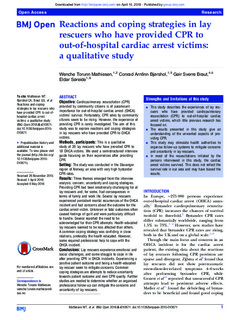| dc.contributor.author | Mathiesen, Wenche Torunn | |
| dc.contributor.author | Bjørshol, Conrad Arnfinn | |
| dc.contributor.author | Braut, Geir Sverre | |
| dc.contributor.author | Søreide, Eldar | |
| dc.date.accessioned | 2018-04-11T11:21:52Z | |
| dc.date.available | 2018-04-11T11:21:52Z | |
| dc.date.created | 2016-08-06T17:50:10Z | |
| dc.date.issued | 2016-05 | |
| dc.identifier.citation | Mathiesen, W.T. et al. (2016) Reactions and coping strategies in lay rescuers who have provided CPR to out-of-hospital cardiac arrest victims: A qualitative study, BMJ Open 2016;6:e010671 | nb_NO |
| dc.identifier.issn | 2044-6055 | |
| dc.identifier.uri | http://hdl.handle.net/11250/2493636 | |
| dc.description.abstract | Objective Cardiopulmonary resuscitation (CPR) provided by community citizens is of paramount importance for out-of-hospital cardiac arrest (OHCA) victims' survival. Fortunately, CPR rates by community citizens seem to be rising. However, the experience of providing CPR is rarely investigated. The aim of this study was to explore reactions and coping strategies in lay rescuers who have provided CPR to OHCA victims.
Methods, participants This is a qualitative study of 20 lay rescuers who have provided CPR to 18 OHCA victims. We used a semistructured interview guide focusing on their experiences after providing CPR.
Setting The study was conducted in the Stavanger region of Norway, an area with very high bystander CPR rates.
Results Three themes emerged from the interview analysis: concern, uncertainty and coping strategies. Providing CPR had been emotionally challenging for all lay rescuers and, for some, had consequences in terms of family and work life. Several lay rescuers experienced persistent mental recurrences of the OHCA incident and had concerns about the outcome for the cardiac arrest victim. Unknown or fatal outcomes often caused feelings of guilt and were particularly difficult to handle. Several reported the need to be acknowledged for their CPR attempts. Health-educated lay rescuers seemed to be less affected than others. A common coping strategy was confiding in close relations, preferably the health educated. However, some required professional help to cope with the OHCA incident.
Conclusions Lay rescuers experience emotional and social challenges, and some struggle to cope in life after providing CPR in OHCA incidents. Experiencing a positive patient outcome and being a health-educated lay rescuer seem to mitigate concerns. Common coping strategies are attempts to reduce uncertainty towards patient outcome and own CPR quality. Further studies are needed to determine whether an organised professional follow-up can mitigate the concerns and uncertainty of lay rescuers. | nb_NO |
| dc.language.iso | eng | nb_NO |
| dc.publisher | BMJ Publishing Group | nb_NO |
| dc.rights | Navngivelse-Ikkekommersiell 4.0 Internasjonal | * |
| dc.rights.uri | http://creativecommons.org/licenses/by-nc/4.0/deed.no | * |
| dc.subject | CPR | nb_NO |
| dc.subject | HLR | nb_NO |
| dc.subject | hjerte-lunge-redning | nb_NO |
| dc.subject | hjerte- og lungeredning | nb_NO |
| dc.subject | coping strategies | nb_NO |
| dc.title | Reactions and coping strategies in lay rescuers who have provided CPR to out-of-hospital cardiac arrest victims: A qualitative study | nb_NO |
| dc.type | Journal article | nb_NO |
| dc.type | Peer reviewed | nb_NO |
| dc.description.version | publishedVersion | nb_NO |
| dc.subject.nsi | VDP::Medical disciplines: 700 | nb_NO |
| dc.source.volume | 6:e010671 | nb_NO |
| dc.source.journal | BMJ Open | nb_NO |
| dc.source.issue | 5 | nb_NO |
| dc.identifier.doi | 10.1136/bmjopen-2015-010671 | |
| dc.identifier.cristin | 1370847 | |
| cristin.unitcode | 217,13,0,0 | |
| cristin.unitname | Det helsevitenskapelige fakultet | |
| cristin.ispublished | true | |
| cristin.fulltext | original | |
| cristin.qualitycode | 1 | |

